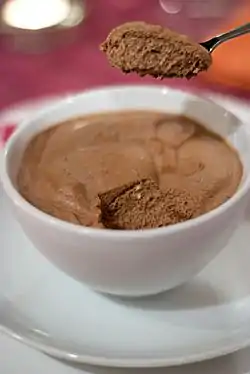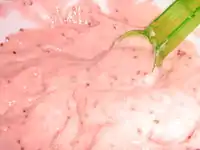Mousse
A mousse (/ˈmuːs/; French: [mus]; "foam") is a soft prepared food that incorporates air bubbles to give it a light and airy texture. It can range from light and fluffy to creamy and thick, depending on preparation techniques. A mousse may be sweet or savory.[1]
 Chocolate mousse garnished with ground cinnamon | |
| Course | Dessert |
|---|---|
| Place of origin | France |
| Main ingredients | Whipped egg whites or whipped cream, chocolate or puréed fruit |
| Variations | Chocolate, vanilla, strawberry, choco vanilla etc. |
Sweet mousses are typically made with whipped egg whites, whipped cream,[2] or both, and flavored with one or more of chocolate, coffee, caramel,[3] puréed fruits, or various herbs and spices, such as mint or vanilla.[4] In the case of some chocolate mousses, egg yolks are often stirred into melted chocolate to give the final product a richer mouthfeel. Mousses are also typically chilled before being served, which gives them a denser texture. Sweetened mousse is served as a dessert, or used as an airy cake filling. It is sometimes stabilized with gelatin.[5][6]
Savory mousses can be made from meat, fish, shellfish, foie gras, cheese, or vegetables. Hot mousses often get their light texture from the addition of beaten egg whites.[1]
History
Various desserts consisting of whipped cream in pyramidal shapes with coffee, liqueurs, chocolate, fruits, and so on either in the mixture or poured on top were called crème en mousse 'cream in a foam', crème mousseuse 'foamy cream', mousse 'foam', and so on,[7][8] as early as 1768.[9][10][11] Modern mousses are a continuation of this tradition.
Savoury mousse
Fish mousse with brown bread and butter was a popular meal of American cuisine, and is still sometimes made as a party dip, although it's not as common as it was in the 1950s.[12][13]
Gallery
.jpg.webp) Lemon mousse with peach compote
Lemon mousse with peach compote Savory salmon mousse
Savory salmon mousse Mousse cake
Mousse cake Redcurrant semolina mousse
Redcurrant semolina mousse
See also
| Look up mousse in Wiktionary, the free dictionary. |
References
- "Mousse". Food Network Food Encyclopedia. Retrieved February 21, 2017.
- Prosper Montagné, Larousse Gastronomique, 1961 (English translation of 1938 French edition), p. 630
- "Caramel & White Chocolate Mousse Recipe". VideoCulinary.com. Retrieved 2016-01-04.
- "How to prepare Mousse".
- Hyman, Gaston (1977). Hyman, Phillip; Hyman, Mary (eds.). Lenôtre's Desserts and Pastries (1st ed.). Woodbury, New York: Barrons Educational Series Inc. p. 78. ISBN 978-0812051377.
- "Paris Confidential: The Mystery Mousse Behind The Chocolate Bar". NPR.org. Retrieved 2017-10-05.
- M. Emy (officier), L'Art de bien faire les glaces d'office... avec un traité sur les mousses, Paris, 1768 p. 222
- Alexandre-Balthazar-Laurent Grimod de La Reynière, Néo-Physiologie du gout par order alphabétique ou Dictionnaire générale de la cuisine française, 1839, p. 184
- Jim Chevallier, A History of the Food of Paris: From Roast Mammoth to Steak Frites, 2018, ISBN 1442272821, p. 195
- "Tante Marie", La Véritable cuisine de famille, comprenant 1.000 recettes et 500 menus, 18??, p. 296 "Crème fouettée (ou Fromage à la Chantilly)"
- Mrs. Beeton, The book of household management, 1888, p. 927
- Good Housekeeping, July 1907
- "Bring Back Salmon Mousse". Taste Magazine. Penguin Random House.
| Wikimedia Commons has media related to Mousse. |
| Wikibooks Cookbook has a recipe/module on |
